外研版(2019)选择性必修第四册 Unit1 Looking forwards 语法-情景破学案(有答案0
文档属性
| 名称 | 外研版(2019)选择性必修第四册 Unit1 Looking forwards 语法-情景破学案(有答案0 | 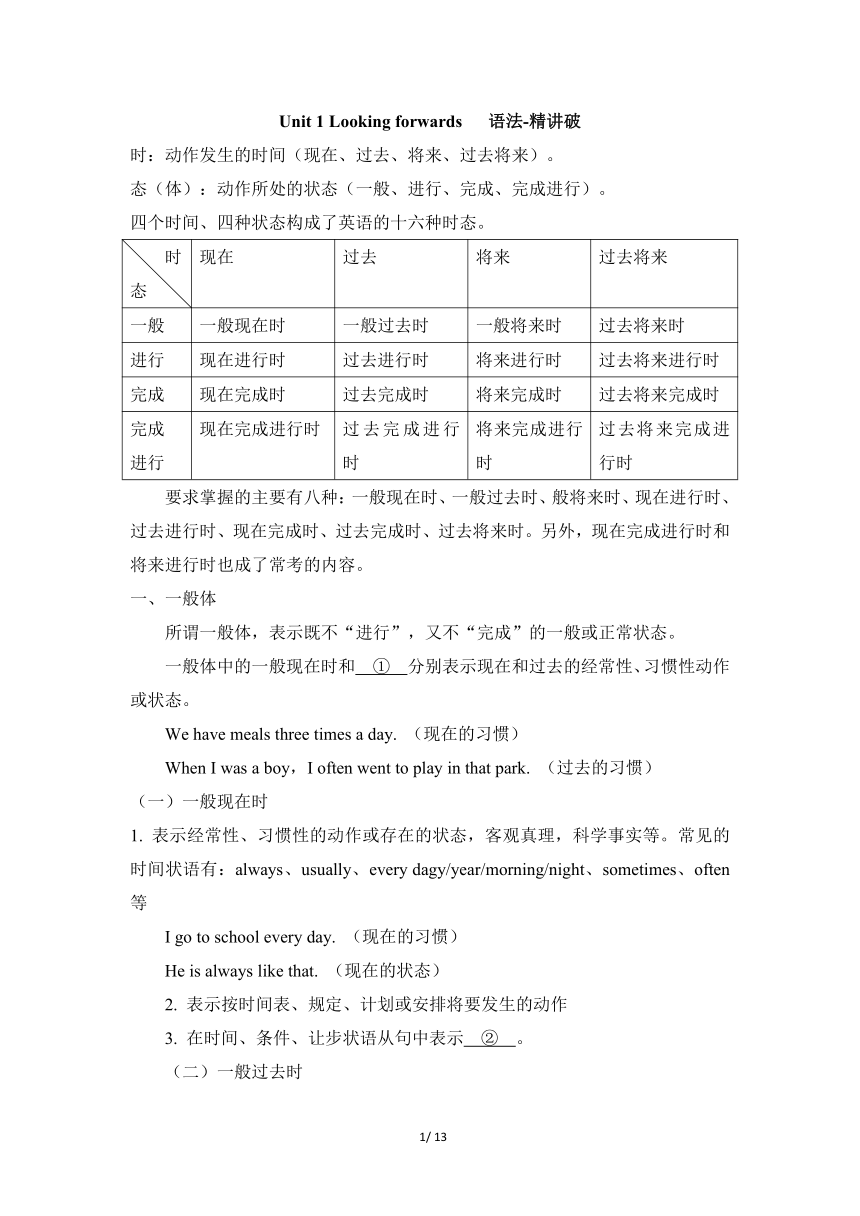 | |
| 格式 | docx | ||
| 文件大小 | 35.5KB | ||
| 资源类型 | 教案 | ||
| 版本资源 | 外研版(2019) | ||
| 科目 | 英语 | ||
| 更新时间 | 2023-03-06 22:05:22 | ||
图片预览

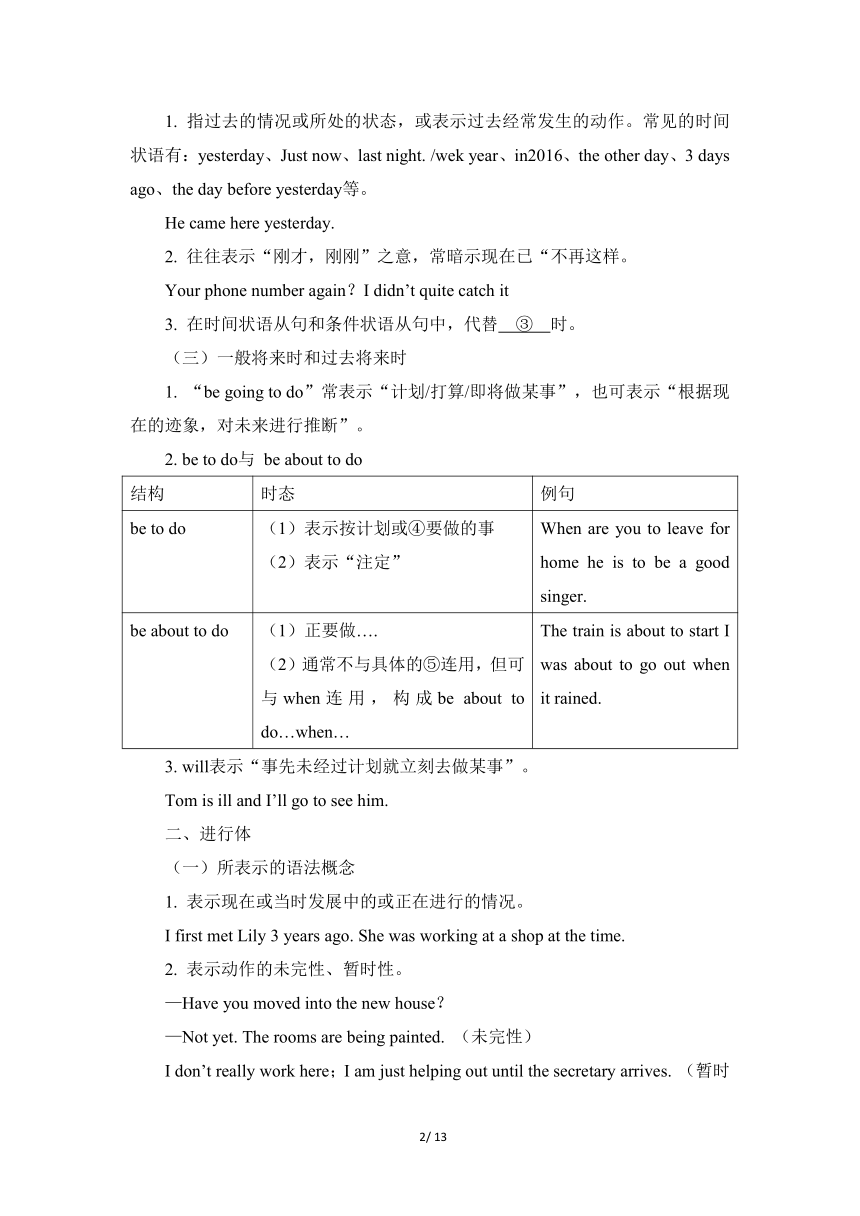
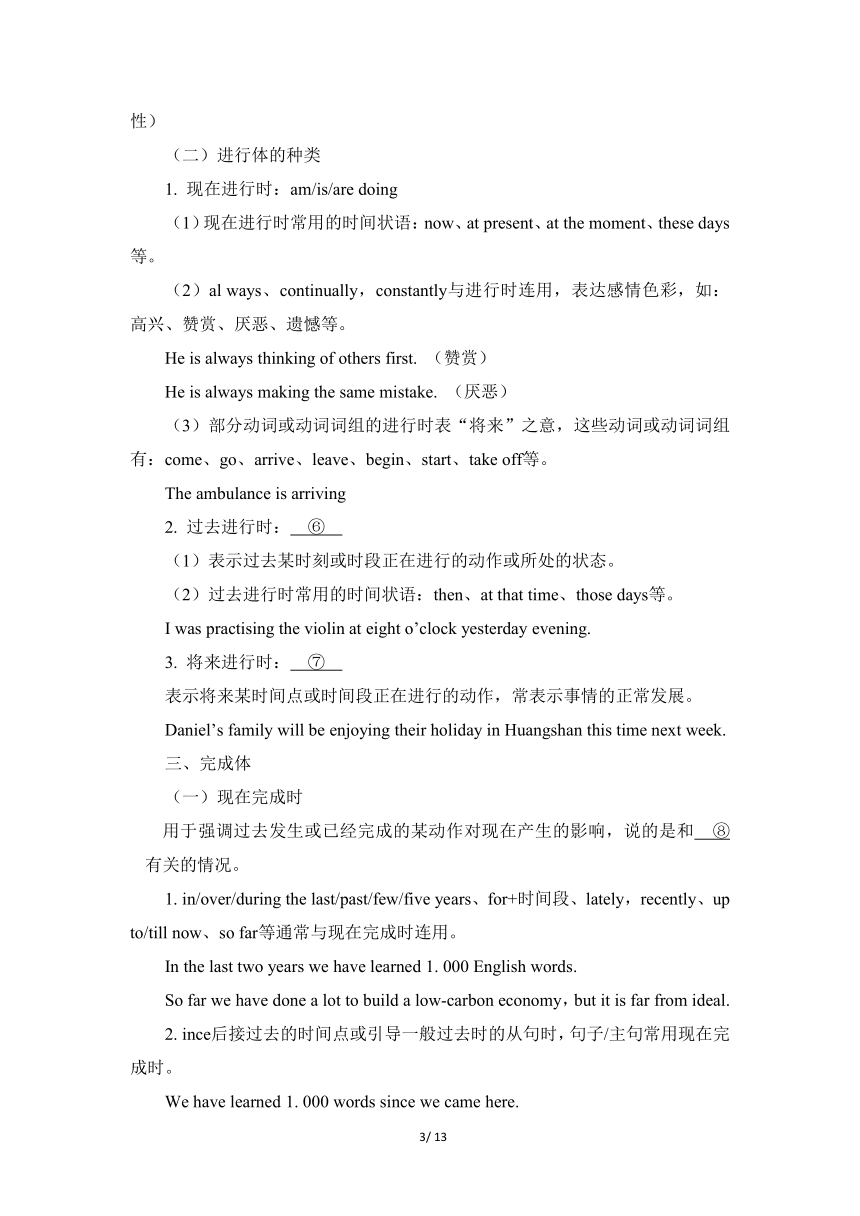
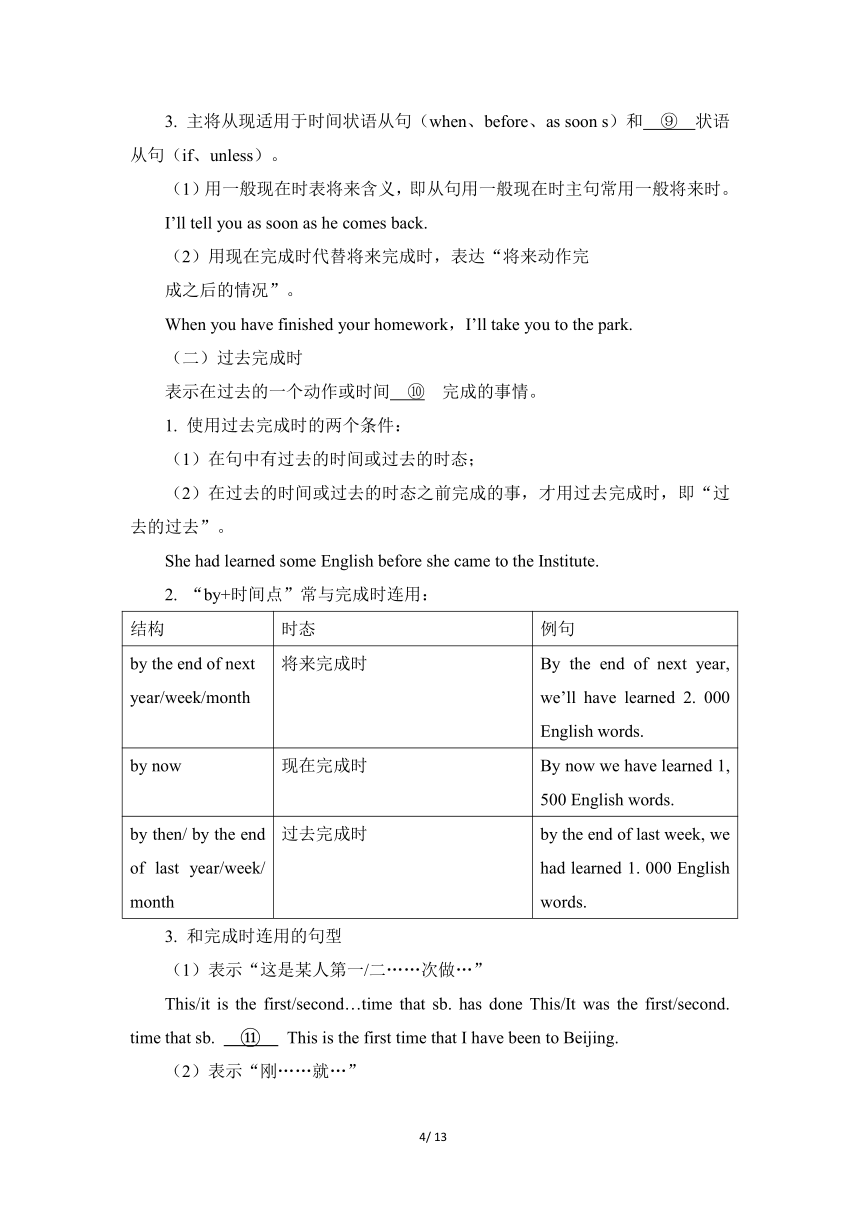
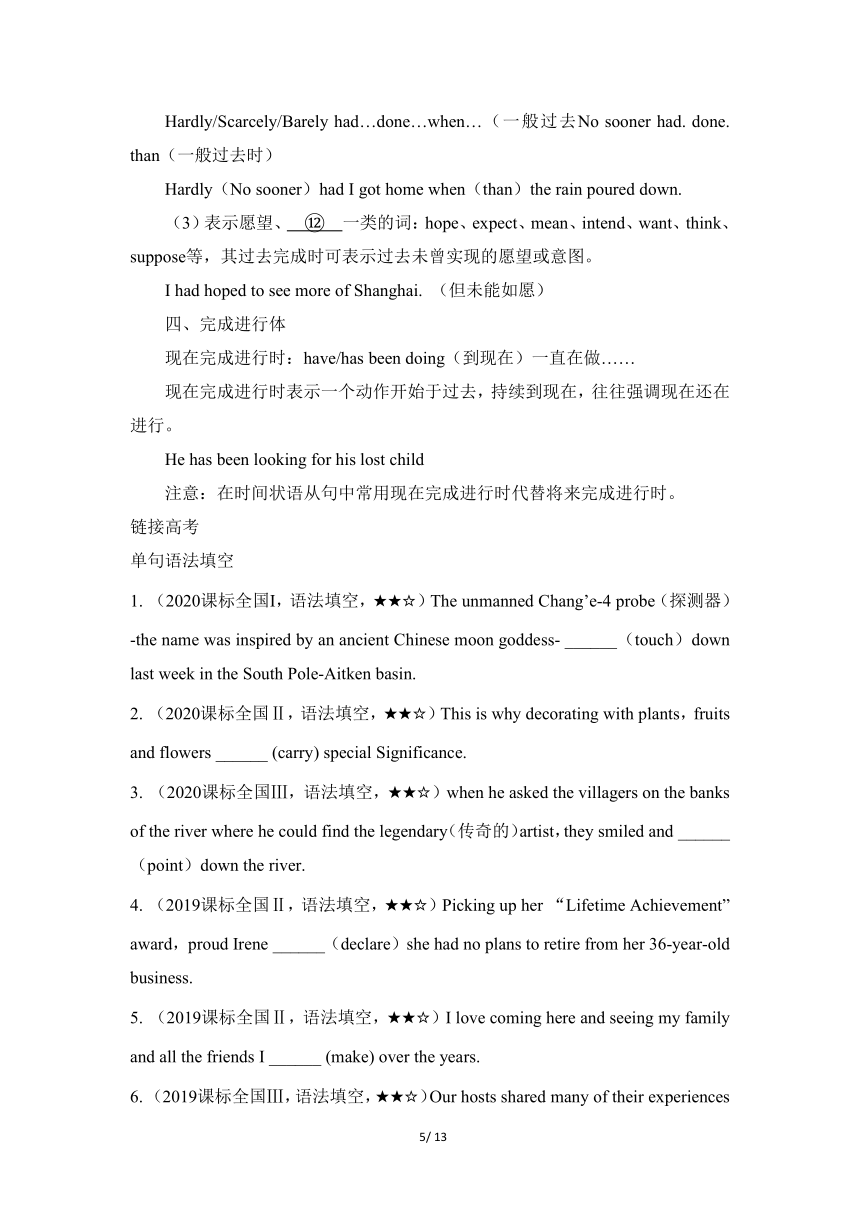
文档简介
Unit 1 Looking forwards 语法-精讲破
时:动作发生的时间(现在、过去、将来、过去将来)。
态(体):动作所处的状态(一般、进行、完成、完成进行)。
四个时间、四种状态构成了英语的十六种时态。
时 态 现在 过去 将来 过去将来
一般 一般现在时 一般过去时 一般将来时 过去将来时
进行 现在进行时 过去进行时 将来进行时 过去将来进行时
完成 现在完成时 过去完成时 将来完成时 过去将来完成时
完成 进行 现在完成进行时 过去完成进行时 将来完成进行时 过去将来完成进行时
要求掌握的主要有八种:一般现在时、一般过去时、般将来时、现在进行时、过去进行时、现在完成时、过去完成时、过去将来时。另外,现在完成进行时和将来进行时也成了常考的内容。
一、一般体
所谓一般体,表示既不“进行”,又不“完成”的一般或正常状态。
一般体中的一般现在时和 ① 分别表示现在和过去的经常性、习惯性动作或状态。
We have meals three times a day. (现在的习惯)
When I was a boy,I often went to play in that park. (过去的习惯)
(一)一般现在时
1. 表示经常性、习惯性的动作或存在的状态,客观真理,科学事实等。常见的时间状语有:always、usually、every dagy/year/morning/night、sometimes、often等
I go to school every day. (现在的习惯)
He is always like that. (现在的状态)
2. 表示按时间表、规定、计划或安排将要发生的动作
3. 在时间、条件、让步状语从句中表示 ② 。
(二)一般过去时
1. 指过去的情况或所处的状态,或表示过去经常发生的动作。常见的时间状语有:yesterday、Just now、last night. /wek year、in2016、the other day、3 days ago、the day before yesterday等。
He came here yesterday.
2. 往往表示“刚才,刚刚”之意,常暗示现在已“不再这样。
Your phone number again?I didn’t quite catch it
3. 在时间状语从句和条件状语从句中,代替 ③ 时。
(三)一般将来时和过去将来时
1. “be going to do”常表示“计划/打算/即将做某事”,也可表示“根据现在的迹象,对未来进行推断”。
2. be to do与 be about to do
结构 时态 例句
be to do (1)表示按计划或④要做的事 (2)表示“注定” When are you to leave for home he is to be a good singer.
be about to do (1)正要做…. (2)通常不与具体的⑤连用,但可与when连用,构成be about to do…when… The train is about to start I was about to go out when it rained.
3. will表示“事先未经过计划就立刻去做某事”。
Tom is ill and I’ll go to see him.
二、进行体
(一)所表示的语法概念
1. 表示现在或当时发展中的或正在进行的情况。
I first met Lily 3 years ago. She was working at a shop at the time.
2. 表示动作的未完性、暂时性。
—Have you moved into the new house?
—Not yet. The rooms are being painted. (未完性)
I don’t really work here;I am just helping out until the secretary arrives. (暂时性)
(二)进行体的种类
1. 现在进行时:am/is/are doing
(1)现在进行时常用的时间状语:now、at present、at the moment、these days等。
(2)al ways、continually,constantly与进行时连用,表达感彩,如:高兴、赞赏、厌恶、遗憾等。
He is always thinking of others first. (赞赏)
He is always making the same mistake. (厌恶)
(3)部分动词或动词词组的进行时表“将来”之意,这些动词或动词词组有:come、go、arrive、leave、begin、start、take off等。
The ambulance is arriving
2. 过去进行时: ⑥
(1)表示过去某时刻或时段正在进行的动作或所处的状态。
(2)过去进行时常用的时间状语:then、at that time、those days等。
I was practising the violin at eight o’clock yesterday evening.
3. 将来进行时: ⑦
表示将来某时间点或时间段正在进行的动作,常表示事情的正常发展。
Daniel’s family will be enjoying their holiday in Huangshan this time next week.
三、完成体
(一)现在完成时
用于强调过去发生或已经完成的某动作对现在产生的影响,说的是和 ⑧ 有关的情况。
1. in/over/during the last/past/few/five years、for+时间段、lately,recently、up to/till now、so far等通常与现在完成时连用。
In the last two years we have learned 1. 000 English words.
So far we have done a lot to build a low-carbon economy,but it is far from ideal.
2. ince后接过去的时间点或引导一般过去时的从句时,句子/主句常用现在完成时。
We have learned 1. 000 words since we came here.
3. 主将从现适用于时间状语从句(when、before、as soon s)和 ⑨ 状语从句(if、unless)。
(1)用一般现在时表将来含义,即从句用一般现在时主句常用一般将来时。
I’ll tell you as soon as he comes back.
(2)用现在完成时代替将来完成时,表达“将来动作完
成之后的情况”。
When you have finished your homework,I’ll take you to the park.
(二)过去完成时
表示在过去的一个动作或时间 ⑩ 完成的事情。
1. 使用过去完成时的两个条件:
(1)在句中有过去的时间或过去的时态;
(2)在过去的时间或过去的时态之前完成的事,才用过去完成时,即“过去的过去”。
She had learned some English before she came to the Institute.
2. “by+时间点”常与完成时连用:
结构 时态 例句
by the end of next year/week/month 将来完成时 By the end of next year, we’ll have learned 2. 000 English words.
by now 现在完成时 By now we have learned 1, 500 English words.
by then/ by the end of last year/week/ month 过去完成时 by the end of last week, we had learned 1. 000 English words.
3. 和完成时连用的句型
(1)表示“这是某人第一/二……次做…”
This/it is the first/second…time that sb. has done This/It was the first/second. time that sb. This is the first time that I have been to Beijing.
(2)表示“刚……就…”
Hardly/Scarcely/Barely had…done…when…(一般过去No sooner had. done. than(一般过去时)
Hardly(No sooner)had I got home when(than)the rain poured down.
(3)表示愿望、 一类的词:hope、expect、mean、intend、want、think、suppose等,其过去完成时可表示过去未曾实现的愿望或意图。
I had hoped to see more of Shanghai. (但未能如愿)
四、完成进行体
现在完成进行时:have/has been doing(到现在)一直在做……
现在完成进行时表示一个动作开始于过去,持续到现在,往往强调现在还在进行。
He has been looking for his lost child
注意:在时间状语从句中常用现在完成进行时代替将来完成进行时。
链接高考
单句语法填空
1. (2020课标全国I,语法填空,★★☆)The unmanned Chang’e-4 probe(探测器)-the name was inspired by an ancient Chinese moon goddess- ______(touch)down last week in the South Pole-Aitken basin.
2. (2020课标全国Ⅱ,语法填空,★★☆)This is why decorating with plants,fruits and flowers ______ (carry) special Significance.
3. (2020课标全国Ⅲ,语法填空,★★☆)when he asked the villagers on the banks of the river where he could find the legendary(传奇的)artist,they smiled and ______ (point)down the river.
4. (2019课标全国Ⅱ,语法填空,★★☆)Picking up her “Lifetime Achievement” award,proud Irene ______(declare)she had no plans to retire from her 36-year-old business.
5. (2019课标全国Ⅱ,语法填空,★★☆)I love coming here and seeing my family and all the friends I ______ (make) over the years.
6. (2019课标全国Ⅲ,语法填空,★★☆)Our hosts shared many of their experiences and ________ (recommend)wonderful places to eat,shop,and visit.
7. (2019江苏,22,★★☆)The musician along with his band members ______ (give) ten performances in the last three months.
8. (2019江苏,29,★★☆)A few months after he had arrived in China. Mr. Smith ______ (fall)in love with the people and culture there.
9. (2019天津,2,★★☆)I ______(hope)t send Peter a gift to congratulate him on his marriage,but I couldn’t manage it.
10. (2018课标全国I,短文改错,★☆☆)During my last winter holiday,I ______(go)to countryside with my father to visit my grandparents.
11. (2018课标全国Ⅱ,语法填空,★★☆)Since 2011,the country ______ (grow) more corn than rice.
12. (2018课标全国Ⅱ,短文改错,★★☆)I didn’t realize how right my parents ______ (be)until I entered high school.
13. (2018浙江11月,语法填空,★★☆)You probably ______(use)caffeine since childhood.
14. (2018北京,4,★★☆)Susan had quit her well-paid job and ______ (work)as a volunteer in the neighborhood when I visited her last year.
15. (2018北京,7,★☆☆)China’s high-sped railways ______(grow)from 9,000 to 25,000 kilometers in the past few years.
16. (2017课标全国I,短文改错,★★☆)I forgot what he ______(say)to me altogether.
17. (2017课标全国Ⅱ,语法填空,★★☆)Later,engineers ______ (manage) to construct railways in a system of deep tunnels(隧道),which became known as the Tube.
18. (2017课标全国Ⅱ,短文改错,★★☆)When summer ______ (come) will invite their students to pick the fresh vegetables.
19. (2017课标全国Ⅲ,短文改错,★☆☆)I ______ (grow)not only physically also mentally in the past few years.
20. (2017北京,33,★★☆)People ______(have)better access to health care than they used to,and they’re living longer as a result.
21. (2017天津,8,★★☆)I ______ (drive) down to London when I suddenly found that I was on the wrong road.
22. (2017江苏,24,★★☆)The publication of Great Expectations,which ______(be)both widely reviewed and highly praised,strengthened Dickens status as a leading novelist.
23. (2017江苏,31,★★☆)He’s been informed that he ______ (not qualify) for the scholarship because of his academic background.
24. (2017浙江,语法填空,★★☆)Pahlsson and her husband ______ (search) the kitchen,checking every corner,but turned up nothing.
25. (2016天津,3,★★☆)When walking down the street,I came across David,______ (not see) for years.
26(2016北京,25,★★☆)I ______(read)half of the English novel,and I’ll try to finish it at the weekend.
27. (2016浙江,9,★★☆)Silk ______ (become) one of the primary goods traded along the Silk Road by about100 BC.
28. (★★☆) In the last few years, China ______ (make) great achievements in environmental protection.
29. (★★☆)-Did you have difficulty finding Ann’s house
-Not really. She ______ (give) us clear directions and we were able to find it easily.
30. (★★☆)-Dr Jackson is not in his office at the moment. All right. I ______ (call) him lat.
31. (★★☆) Jane can’t attend the meeting at 3 o’clock this afternoon because she ______ (teach) a class at that time.
32. (★★☆) Tom had to turn down the invitation to the party last weekend because he ______ (be)too busy.
33. (★★☆)-Is Peter coming No, he ______ (change) his mind after a phone call at the last minute.
34. (★★☆) Just as I got to the school gate, I realized I ______ (leave) my book in the café.
35. ( ★★☆) As you go through this book ______ (find) that each of the millions of people who lived through World War had a different experience.
36. ( ★★☆) He must have sensed that I ______ (look) at him. He suddenly lanced at me and said quietly, “Why are you staring at me like that ”
37(★★☆)-Where is Peter I can’t find him anywhere.
—He went to the library after breakfast and ______ (write) his essay there ever since.
38. ( ★★☆) Ellen is a fantastic dancer. I wish ______ (dance) as well as her.
39. (★★☆) The reports went missing in 2012 and nobody ______ (see) them since.
40. (★★☆)-Hi, let’s go skating. -Sorry I’m busy right now. I ______ (fill) in an application form for a new job.
41. ( ★★☆) Jane is in a hurry because the train to the airport ______ (leave) in half an hour.
42. ( ★★☆)-What time is it —I have no idea. But just a minute, I ______ (check) it for you.
43. ( ★★☆)I found the lecture hard to follow because it ______ (start) when I arrived.
44. (★★☆) The twins, who ______ (finish) their homework, were allowed to play badminton on the playground.
45. ( ★★☆)— Haven’ t seen you for ages! Where have you been
—I went to Ningxia and ______ (stay) there for one year, teaching as a volunteer.
参考答案:
①一般过去时 ②将来 ③过去将来 ④安排 ⑤时间状语 ⑥was/were doing
⑦ will be doing ⑧现在 ⑨条件 ⑩之前 had done 打算
l. touched 句意:无人探测器嫦娥四号——名字的灵感来源于中国古代的月亮女神—上周在南极-艾托肯盆地着陆。根据时间状语 last week可知,本空应使用一般过去时,故填 touched。
2. carries 句意:这就是为什么用植物、水果和鲜花装饰具有特殊意义。本句表述的是客观事实,应用一般现在时,且从句主语为动名词短语 decorating with plants,fruits and flowers,故本空应用第三人称单数形式,故填carnies。
3. pointed 句意:当他问河岸上的村民,他在哪里可以找到这位传奇艺术家时,他们笑着指着河的下游。根据前面的 they smiled and可知此处应用一般过去时,故填pointed。
4. declared 句意:捧着她的“终身成就”奖,自豪的艾琳宣称她没有从自己36年的事业中退休的计划。根据句中had可知,本空应用一般过去时。
5. have made 句意:我喜欢来这里,看看我的家人和我多年来交的所有朋友。根据句意及 over the years可知,本空应用现在完成时。
6. recommended 句意:我们的主人分享了很多他们的经历并推荐了一些很好的吃饭、购物和参观的地方。and前后两个动词的时态应保持一致,根据空前shared可知,本空应用一般过去时。
7. has given 句意:在过去的三个月里,这名音乐家与他的乐队成员已经完成了十场演出。根据时间状语in the last three months可知,本空应用现在完成时,且句子主语 The musician为第三人称单数形式,句中along with his band members是附加成分,故谓语动词要用第三人称单数形式,故填 has given。
8. fell 句意:史密斯先生到中国几个月后就喜欢上了那里的人和文化。根据句意可知,本空动作发生在had arrived之后,故应用一般过去时。
9. had hoped 句意:我本来希望在 Peter结婚时送他个礼物表示祝贺,可是我没有做到。根据句意可知本空应用过去完成时表示“原来打算做而未做的事。
10. wen t句意:去年寒假期间,我和父亲去乡下看望了爷爷奶奶。根据时间状语 During my last winter holiday可知,本句应用一般过去时。
11. has grown 句意:自从2011年以来,这个国家已经种植了比水稻更多的玉米。根据时间状语 Since 2011可知,本空应用现在完成时。
12. were 句意:直到我进入高中我才意识到我父母是多么正确。根据句意及didn’t realize可知,本空应用般过去时。
13. have used 句意:你可能从小就使用咖啡因。根据since childhood可知本空应用现在完成时。
14. was working 句意:去年我拜访苏珊的时候,她已经辞去了那份高薪的工作,正在社区作为志愿者工作。根据时间状语 when I visited her last year可知Susan那时正在做志愿者,故本空应用过去进行时。
15. have grown 考查现在完成时。句意:在过去的几年里,中国的高铁已经从9,000公里发展到了25,000公里。根据时间状语 in the past few years可知,句中谓语动词的时态应用现在完成时。现在完成时的标志词(组)有:in the past/last+一段时间、recently、so far、upto/till now、already等。
16. had said 句意:我把他对我说的话都忘了。根据句意可知,本空动作发生在 forgot之前,为“过去的过去”,故本空应用过去完成时。
1 7. manage d句意:后来,工程师们设法在一个深隧道系统中修建铁路,这被称为“地铁”。根据句意可知,本句讲述的是发生在过去的事情,故应用一般过
去时。
es 句意:当夏季到来时,他们会邀请他们的学生采摘新鲜的蔬菜!本句中,主句用一般将来时,故When引导的时间状语从句应用一般现在时代替
般将来时。
19. have grown 句意:在过去的这几年,我不仅身体上成长了,而且在思想上也有成长。根据时间状语in the past few years可知,本句应用现在完成时。
20. have 句意:人们有了比过去更便捷的医疗服务,结果,人们更长寿了。根据后面的 than they used to和they’re living longer as a result可知,本句在比较过去和现在的医疗状况,且本空说的是现在的情况,应用般现在时。
21. was driving 句意:我正在开车前往伦敦,这时突然发现我走错路了。本句为“sb. was/were doing sth. when…”句型,意为“某人正在做某事,这时故本空应用过去进行时。
22. was 句意:《远大前程》这本书被广泛地评价和高度地赞扬,它的出版巩固了狄更斯作为最杰出的小说家的地位。根据 strengthened可知,本句应用一般过去时;which引导非限制性定语从句,先行词为 greatExpectations这本书,因此定语从句中的be动词应用单数形式。
23. doesn’t qualify 句意:他被告知,由于他的学术背景,他没有资格获得奖学金。“没有资格”属于客观事实,故应用一般现在时。
24. earched 句意:Pahlsson和她的丈夫搜索厨房,检查了每个角落,但什么也没找到。根据 but turned up nothing可知,本句描述的是过去发生的行为,故应用般过去时。
25. hadn’tsen 句意:在街上走着的时候,我碰见了戴维,我好多年没见过他了。本句中动作 not see发生在动作 came across之前,为“过去的过去”,故本空应用过去完成时。
26. have read 句意:这本英文小说我已经读一半了,这个周末我会尽量把它读完。根据后面的 I’ll try to finish it at the weekend可知,我“已经”读了一半,故本空应用现在完成时。
27. had become 句意:到大约公元前100年,丝绸已经成为沿丝绸之路交易的主要货物之一。根据时间状语 by about100BC可知,become表示的动作发生在“过去的过去”,故本空应用过去完成时。
28. has made 句意:在过去的几年里,中国在环境保护方面取得了巨大成就。根据时间状语 In the last few years可知,本空应用现在完成时。
29. had given 句意:你们找安的家有困难吗?——没什么困难。她已经告诉我们清晰的方向,我们很容易就找到了。根据句意可知,本空动作发生在 were able to find之前,为“过去的过去”,故本空应用过去完成时。
30. will call 句意:杰克逊医生此刻不在办公室里。—好吧。我晚些时候会给他打电话。由句意可知,call是“临时决定”将来要做的动作,故应用般将来时 will call。
31. will be teaching 句意:简不能参加今天下午三点的会议了,因为她那个时间正在授课。根据句意可知,本空表示未来某个时间正在发生的动作,故应用将来进行时。
32. was 句 意:上周末汤姆不得不拒绝参加聚会的邀请,因为他太忙了。根据 last weekend可知,本空应用一般过去时。
33. changed 句意:—彼得来了吗?—没有,他在最后一刻接到一个电话后改变了主意。根据 at the last minute可知,本句动作发生在过去,故本空应用般过去时。
34. had lef t句意:就在我到达校门口的时候,我才意识到我把书落在咖啡馆里了。根据句意可知,本空动作发生在 realized之前,属于“过去的过去”,故本空应用过去完成时。
35. will find 句意:当你读这本书时,你就会发现那些经历过第二次世界大战的数百万人中的每一个人都有不同的经历。本句中As引导的时间状语从句用般现在时代替一般将来时,且结合句意可知主句应用般将来时。
36. was looking 句意:他一定是感觉到了我在看他。他突然瞥了我一眼,然后轻声说道:“为什么你那样盯着我?”根据句意可知本空应用过去进行时。
37. has been writing 句意:—彼得在哪儿?我到处都找不到他。—他早饭后去图书馆了,并且从那时起一直在那儿写他的文章。由 ever since可知,彼得从早饭后一直在图书馆写文章(说话时应该仍然在写),故本空应用现在完成进行时表示动作从过去持续到现在,并且有可能持续下去。
38. danced 句意:埃伦是一位了不起的舞蹈家。要是我能跳得像她一样好那该有多好啊。wish后的宾语从句应用虚拟语气,叙述与现在事实相反的情况时,谓语动词用过去式(be用were),故本空应用一般过去时。
39. has seen 句意:这些报告在2012年遗失了,自那之后就没有人看见过。根据 since可知,本空应用现在完成时。
40. am filling 句意:-嗨,我们去滑冰吧。—抱歉,我现在很忙。我正在填一份新工作的申请表。根据句意可知,说话者此时正在填一份新工作的申请表,故本句应用现在进行时。
41. leaves 句意:简很匆忙,因为开往机场的火车半小时后就要离开了。按规定、计划或时间表将要发生的动作,虽然后跟表示将来的时间状语,但常用一般现在时。
42. will check 句意:——几点了?—我不知道。等下,我给你看一下。根据 I have no idea. 可知,说话人不知道几点,因此 check为“临时决定”要做的动作,故本空应用一般将来时 will check。
43. had started 句意:我发现我很难明白讲座的内容,因为当我到的时候它已经开始了。根据句意可知,本空动作发生在 arrived之前,属于“过去的过去”,故本空应用过去完成时。
44. had finished 句意:这对双胞胎已经完成了家庭作业,她们被允许在操场上打羽毛球。根据句意可知,本空动作发生在 were allowed之前,即“过去的过去”,故本空应用过去完成时。
45. stayed 句意:-—很久没有见到你了!你去哪里了我去了宁夏,在那里待了一年,作为一名志愿者教学。答句由 and 连接两个并列的谓语动词,根据went可知本空应用一般过去时。
时:动作发生的时间(现在、过去、将来、过去将来)。
态(体):动作所处的状态(一般、进行、完成、完成进行)。
四个时间、四种状态构成了英语的十六种时态。
时 态 现在 过去 将来 过去将来
一般 一般现在时 一般过去时 一般将来时 过去将来时
进行 现在进行时 过去进行时 将来进行时 过去将来进行时
完成 现在完成时 过去完成时 将来完成时 过去将来完成时
完成 进行 现在完成进行时 过去完成进行时 将来完成进行时 过去将来完成进行时
要求掌握的主要有八种:一般现在时、一般过去时、般将来时、现在进行时、过去进行时、现在完成时、过去完成时、过去将来时。另外,现在完成进行时和将来进行时也成了常考的内容。
一、一般体
所谓一般体,表示既不“进行”,又不“完成”的一般或正常状态。
一般体中的一般现在时和 ① 分别表示现在和过去的经常性、习惯性动作或状态。
We have meals three times a day. (现在的习惯)
When I was a boy,I often went to play in that park. (过去的习惯)
(一)一般现在时
1. 表示经常性、习惯性的动作或存在的状态,客观真理,科学事实等。常见的时间状语有:always、usually、every dagy/year/morning/night、sometimes、often等
I go to school every day. (现在的习惯)
He is always like that. (现在的状态)
2. 表示按时间表、规定、计划或安排将要发生的动作
3. 在时间、条件、让步状语从句中表示 ② 。
(二)一般过去时
1. 指过去的情况或所处的状态,或表示过去经常发生的动作。常见的时间状语有:yesterday、Just now、last night. /wek year、in2016、the other day、3 days ago、the day before yesterday等。
He came here yesterday.
2. 往往表示“刚才,刚刚”之意,常暗示现在已“不再这样。
Your phone number again?I didn’t quite catch it
3. 在时间状语从句和条件状语从句中,代替 ③ 时。
(三)一般将来时和过去将来时
1. “be going to do”常表示“计划/打算/即将做某事”,也可表示“根据现在的迹象,对未来进行推断”。
2. be to do与 be about to do
结构 时态 例句
be to do (1)表示按计划或④要做的事 (2)表示“注定” When are you to leave for home he is to be a good singer.
be about to do (1)正要做…. (2)通常不与具体的⑤连用,但可与when连用,构成be about to do…when… The train is about to start I was about to go out when it rained.
3. will表示“事先未经过计划就立刻去做某事”。
Tom is ill and I’ll go to see him.
二、进行体
(一)所表示的语法概念
1. 表示现在或当时发展中的或正在进行的情况。
I first met Lily 3 years ago. She was working at a shop at the time.
2. 表示动作的未完性、暂时性。
—Have you moved into the new house?
—Not yet. The rooms are being painted. (未完性)
I don’t really work here;I am just helping out until the secretary arrives. (暂时性)
(二)进行体的种类
1. 现在进行时:am/is/are doing
(1)现在进行时常用的时间状语:now、at present、at the moment、these days等。
(2)al ways、continually,constantly与进行时连用,表达感彩,如:高兴、赞赏、厌恶、遗憾等。
He is always thinking of others first. (赞赏)
He is always making the same mistake. (厌恶)
(3)部分动词或动词词组的进行时表“将来”之意,这些动词或动词词组有:come、go、arrive、leave、begin、start、take off等。
The ambulance is arriving
2. 过去进行时: ⑥
(1)表示过去某时刻或时段正在进行的动作或所处的状态。
(2)过去进行时常用的时间状语:then、at that time、those days等。
I was practising the violin at eight o’clock yesterday evening.
3. 将来进行时: ⑦
表示将来某时间点或时间段正在进行的动作,常表示事情的正常发展。
Daniel’s family will be enjoying their holiday in Huangshan this time next week.
三、完成体
(一)现在完成时
用于强调过去发生或已经完成的某动作对现在产生的影响,说的是和 ⑧ 有关的情况。
1. in/over/during the last/past/few/five years、for+时间段、lately,recently、up to/till now、so far等通常与现在完成时连用。
In the last two years we have learned 1. 000 English words.
So far we have done a lot to build a low-carbon economy,but it is far from ideal.
2. ince后接过去的时间点或引导一般过去时的从句时,句子/主句常用现在完成时。
We have learned 1. 000 words since we came here.
3. 主将从现适用于时间状语从句(when、before、as soon s)和 ⑨ 状语从句(if、unless)。
(1)用一般现在时表将来含义,即从句用一般现在时主句常用一般将来时。
I’ll tell you as soon as he comes back.
(2)用现在完成时代替将来完成时,表达“将来动作完
成之后的情况”。
When you have finished your homework,I’ll take you to the park.
(二)过去完成时
表示在过去的一个动作或时间 ⑩ 完成的事情。
1. 使用过去完成时的两个条件:
(1)在句中有过去的时间或过去的时态;
(2)在过去的时间或过去的时态之前完成的事,才用过去完成时,即“过去的过去”。
She had learned some English before she came to the Institute.
2. “by+时间点”常与完成时连用:
结构 时态 例句
by the end of next year/week/month 将来完成时 By the end of next year, we’ll have learned 2. 000 English words.
by now 现在完成时 By now we have learned 1, 500 English words.
by then/ by the end of last year/week/ month 过去完成时 by the end of last week, we had learned 1. 000 English words.
3. 和完成时连用的句型
(1)表示“这是某人第一/二……次做…”
This/it is the first/second…time that sb. has done This/It was the first/second. time that sb. This is the first time that I have been to Beijing.
(2)表示“刚……就…”
Hardly/Scarcely/Barely had…done…when…(一般过去No sooner had. done. than(一般过去时)
Hardly(No sooner)had I got home when(than)the rain poured down.
(3)表示愿望、 一类的词:hope、expect、mean、intend、want、think、suppose等,其过去完成时可表示过去未曾实现的愿望或意图。
I had hoped to see more of Shanghai. (但未能如愿)
四、完成进行体
现在完成进行时:have/has been doing(到现在)一直在做……
现在完成进行时表示一个动作开始于过去,持续到现在,往往强调现在还在进行。
He has been looking for his lost child
注意:在时间状语从句中常用现在完成进行时代替将来完成进行时。
链接高考
单句语法填空
1. (2020课标全国I,语法填空,★★☆)The unmanned Chang’e-4 probe(探测器)-the name was inspired by an ancient Chinese moon goddess- ______(touch)down last week in the South Pole-Aitken basin.
2. (2020课标全国Ⅱ,语法填空,★★☆)This is why decorating with plants,fruits and flowers ______ (carry) special Significance.
3. (2020课标全国Ⅲ,语法填空,★★☆)when he asked the villagers on the banks of the river where he could find the legendary(传奇的)artist,they smiled and ______ (point)down the river.
4. (2019课标全国Ⅱ,语法填空,★★☆)Picking up her “Lifetime Achievement” award,proud Irene ______(declare)she had no plans to retire from her 36-year-old business.
5. (2019课标全国Ⅱ,语法填空,★★☆)I love coming here and seeing my family and all the friends I ______ (make) over the years.
6. (2019课标全国Ⅲ,语法填空,★★☆)Our hosts shared many of their experiences and ________ (recommend)wonderful places to eat,shop,and visit.
7. (2019江苏,22,★★☆)The musician along with his band members ______ (give) ten performances in the last three months.
8. (2019江苏,29,★★☆)A few months after he had arrived in China. Mr. Smith ______ (fall)in love with the people and culture there.
9. (2019天津,2,★★☆)I ______(hope)t send Peter a gift to congratulate him on his marriage,but I couldn’t manage it.
10. (2018课标全国I,短文改错,★☆☆)During my last winter holiday,I ______(go)to countryside with my father to visit my grandparents.
11. (2018课标全国Ⅱ,语法填空,★★☆)Since 2011,the country ______ (grow) more corn than rice.
12. (2018课标全国Ⅱ,短文改错,★★☆)I didn’t realize how right my parents ______ (be)until I entered high school.
13. (2018浙江11月,语法填空,★★☆)You probably ______(use)caffeine since childhood.
14. (2018北京,4,★★☆)Susan had quit her well-paid job and ______ (work)as a volunteer in the neighborhood when I visited her last year.
15. (2018北京,7,★☆☆)China’s high-sped railways ______(grow)from 9,000 to 25,000 kilometers in the past few years.
16. (2017课标全国I,短文改错,★★☆)I forgot what he ______(say)to me altogether.
17. (2017课标全国Ⅱ,语法填空,★★☆)Later,engineers ______ (manage) to construct railways in a system of deep tunnels(隧道),which became known as the Tube.
18. (2017课标全国Ⅱ,短文改错,★★☆)When summer ______ (come) will invite their students to pick the fresh vegetables.
19. (2017课标全国Ⅲ,短文改错,★☆☆)I ______ (grow)not only physically also mentally in the past few years.
20. (2017北京,33,★★☆)People ______(have)better access to health care than they used to,and they’re living longer as a result.
21. (2017天津,8,★★☆)I ______ (drive) down to London when I suddenly found that I was on the wrong road.
22. (2017江苏,24,★★☆)The publication of Great Expectations,which ______(be)both widely reviewed and highly praised,strengthened Dickens status as a leading novelist.
23. (2017江苏,31,★★☆)He’s been informed that he ______ (not qualify) for the scholarship because of his academic background.
24. (2017浙江,语法填空,★★☆)Pahlsson and her husband ______ (search) the kitchen,checking every corner,but turned up nothing.
25. (2016天津,3,★★☆)When walking down the street,I came across David,______ (not see) for years.
26(2016北京,25,★★☆)I ______(read)half of the English novel,and I’ll try to finish it at the weekend.
27. (2016浙江,9,★★☆)Silk ______ (become) one of the primary goods traded along the Silk Road by about100 BC.
28. (★★☆) In the last few years, China ______ (make) great achievements in environmental protection.
29. (★★☆)-Did you have difficulty finding Ann’s house
-Not really. She ______ (give) us clear directions and we were able to find it easily.
30. (★★☆)-Dr Jackson is not in his office at the moment. All right. I ______ (call) him lat.
31. (★★☆) Jane can’t attend the meeting at 3 o’clock this afternoon because she ______ (teach) a class at that time.
32. (★★☆) Tom had to turn down the invitation to the party last weekend because he ______ (be)too busy.
33. (★★☆)-Is Peter coming No, he ______ (change) his mind after a phone call at the last minute.
34. (★★☆) Just as I got to the school gate, I realized I ______ (leave) my book in the café.
35. ( ★★☆) As you go through this book ______ (find) that each of the millions of people who lived through World War had a different experience.
36. ( ★★☆) He must have sensed that I ______ (look) at him. He suddenly lanced at me and said quietly, “Why are you staring at me like that ”
37(★★☆)-Where is Peter I can’t find him anywhere.
—He went to the library after breakfast and ______ (write) his essay there ever since.
38. ( ★★☆) Ellen is a fantastic dancer. I wish ______ (dance) as well as her.
39. (★★☆) The reports went missing in 2012 and nobody ______ (see) them since.
40. (★★☆)-Hi, let’s go skating. -Sorry I’m busy right now. I ______ (fill) in an application form for a new job.
41. ( ★★☆) Jane is in a hurry because the train to the airport ______ (leave) in half an hour.
42. ( ★★☆)-What time is it —I have no idea. But just a minute, I ______ (check) it for you.
43. ( ★★☆)I found the lecture hard to follow because it ______ (start) when I arrived.
44. (★★☆) The twins, who ______ (finish) their homework, were allowed to play badminton on the playground.
45. ( ★★☆)— Haven’ t seen you for ages! Where have you been
—I went to Ningxia and ______ (stay) there for one year, teaching as a volunteer.
参考答案:
①一般过去时 ②将来 ③过去将来 ④安排 ⑤时间状语 ⑥was/were doing
⑦ will be doing ⑧现在 ⑨条件 ⑩之前 had done 打算
l. touched 句意:无人探测器嫦娥四号——名字的灵感来源于中国古代的月亮女神—上周在南极-艾托肯盆地着陆。根据时间状语 last week可知,本空应使用一般过去时,故填 touched。
2. carries 句意:这就是为什么用植物、水果和鲜花装饰具有特殊意义。本句表述的是客观事实,应用一般现在时,且从句主语为动名词短语 decorating with plants,fruits and flowers,故本空应用第三人称单数形式,故填carnies。
3. pointed 句意:当他问河岸上的村民,他在哪里可以找到这位传奇艺术家时,他们笑着指着河的下游。根据前面的 they smiled and可知此处应用一般过去时,故填pointed。
4. declared 句意:捧着她的“终身成就”奖,自豪的艾琳宣称她没有从自己36年的事业中退休的计划。根据句中had可知,本空应用一般过去时。
5. have made 句意:我喜欢来这里,看看我的家人和我多年来交的所有朋友。根据句意及 over the years可知,本空应用现在完成时。
6. recommended 句意:我们的主人分享了很多他们的经历并推荐了一些很好的吃饭、购物和参观的地方。and前后两个动词的时态应保持一致,根据空前shared可知,本空应用一般过去时。
7. has given 句意:在过去的三个月里,这名音乐家与他的乐队成员已经完成了十场演出。根据时间状语in the last three months可知,本空应用现在完成时,且句子主语 The musician为第三人称单数形式,句中along with his band members是附加成分,故谓语动词要用第三人称单数形式,故填 has given。
8. fell 句意:史密斯先生到中国几个月后就喜欢上了那里的人和文化。根据句意可知,本空动作发生在had arrived之后,故应用一般过去时。
9. had hoped 句意:我本来希望在 Peter结婚时送他个礼物表示祝贺,可是我没有做到。根据句意可知本空应用过去完成时表示“原来打算做而未做的事。
10. wen t句意:去年寒假期间,我和父亲去乡下看望了爷爷奶奶。根据时间状语 During my last winter holiday可知,本句应用一般过去时。
11. has grown 句意:自从2011年以来,这个国家已经种植了比水稻更多的玉米。根据时间状语 Since 2011可知,本空应用现在完成时。
12. were 句意:直到我进入高中我才意识到我父母是多么正确。根据句意及didn’t realize可知,本空应用般过去时。
13. have used 句意:你可能从小就使用咖啡因。根据since childhood可知本空应用现在完成时。
14. was working 句意:去年我拜访苏珊的时候,她已经辞去了那份高薪的工作,正在社区作为志愿者工作。根据时间状语 when I visited her last year可知Susan那时正在做志愿者,故本空应用过去进行时。
15. have grown 考查现在完成时。句意:在过去的几年里,中国的高铁已经从9,000公里发展到了25,000公里。根据时间状语 in the past few years可知,句中谓语动词的时态应用现在完成时。现在完成时的标志词(组)有:in the past/last+一段时间、recently、so far、upto/till now、already等。
16. had said 句意:我把他对我说的话都忘了。根据句意可知,本空动作发生在 forgot之前,为“过去的过去”,故本空应用过去完成时。
1 7. manage d句意:后来,工程师们设法在一个深隧道系统中修建铁路,这被称为“地铁”。根据句意可知,本句讲述的是发生在过去的事情,故应用一般过
去时。
es 句意:当夏季到来时,他们会邀请他们的学生采摘新鲜的蔬菜!本句中,主句用一般将来时,故When引导的时间状语从句应用一般现在时代替
般将来时。
19. have grown 句意:在过去的这几年,我不仅身体上成长了,而且在思想上也有成长。根据时间状语in the past few years可知,本句应用现在完成时。
20. have 句意:人们有了比过去更便捷的医疗服务,结果,人们更长寿了。根据后面的 than they used to和they’re living longer as a result可知,本句在比较过去和现在的医疗状况,且本空说的是现在的情况,应用般现在时。
21. was driving 句意:我正在开车前往伦敦,这时突然发现我走错路了。本句为“sb. was/were doing sth. when…”句型,意为“某人正在做某事,这时故本空应用过去进行时。
22. was 句意:《远大前程》这本书被广泛地评价和高度地赞扬,它的出版巩固了狄更斯作为最杰出的小说家的地位。根据 strengthened可知,本句应用一般过去时;which引导非限制性定语从句,先行词为 greatExpectations这本书,因此定语从句中的be动词应用单数形式。
23. doesn’t qualify 句意:他被告知,由于他的学术背景,他没有资格获得奖学金。“没有资格”属于客观事实,故应用一般现在时。
24. earched 句意:Pahlsson和她的丈夫搜索厨房,检查了每个角落,但什么也没找到。根据 but turned up nothing可知,本句描述的是过去发生的行为,故应用般过去时。
25. hadn’tsen 句意:在街上走着的时候,我碰见了戴维,我好多年没见过他了。本句中动作 not see发生在动作 came across之前,为“过去的过去”,故本空应用过去完成时。
26. have read 句意:这本英文小说我已经读一半了,这个周末我会尽量把它读完。根据后面的 I’ll try to finish it at the weekend可知,我“已经”读了一半,故本空应用现在完成时。
27. had become 句意:到大约公元前100年,丝绸已经成为沿丝绸之路交易的主要货物之一。根据时间状语 by about100BC可知,become表示的动作发生在“过去的过去”,故本空应用过去完成时。
28. has made 句意:在过去的几年里,中国在环境保护方面取得了巨大成就。根据时间状语 In the last few years可知,本空应用现在完成时。
29. had given 句意:你们找安的家有困难吗?——没什么困难。她已经告诉我们清晰的方向,我们很容易就找到了。根据句意可知,本空动作发生在 were able to find之前,为“过去的过去”,故本空应用过去完成时。
30. will call 句意:杰克逊医生此刻不在办公室里。—好吧。我晚些时候会给他打电话。由句意可知,call是“临时决定”将来要做的动作,故应用般将来时 will call。
31. will be teaching 句意:简不能参加今天下午三点的会议了,因为她那个时间正在授课。根据句意可知,本空表示未来某个时间正在发生的动作,故应用将来进行时。
32. was 句 意:上周末汤姆不得不拒绝参加聚会的邀请,因为他太忙了。根据 last weekend可知,本空应用一般过去时。
33. changed 句意:—彼得来了吗?—没有,他在最后一刻接到一个电话后改变了主意。根据 at the last minute可知,本句动作发生在过去,故本空应用般过去时。
34. had lef t句意:就在我到达校门口的时候,我才意识到我把书落在咖啡馆里了。根据句意可知,本空动作发生在 realized之前,属于“过去的过去”,故本空应用过去完成时。
35. will find 句意:当你读这本书时,你就会发现那些经历过第二次世界大战的数百万人中的每一个人都有不同的经历。本句中As引导的时间状语从句用般现在时代替一般将来时,且结合句意可知主句应用般将来时。
36. was looking 句意:他一定是感觉到了我在看他。他突然瞥了我一眼,然后轻声说道:“为什么你那样盯着我?”根据句意可知本空应用过去进行时。
37. has been writing 句意:—彼得在哪儿?我到处都找不到他。—他早饭后去图书馆了,并且从那时起一直在那儿写他的文章。由 ever since可知,彼得从早饭后一直在图书馆写文章(说话时应该仍然在写),故本空应用现在完成进行时表示动作从过去持续到现在,并且有可能持续下去。
38. danced 句意:埃伦是一位了不起的舞蹈家。要是我能跳得像她一样好那该有多好啊。wish后的宾语从句应用虚拟语气,叙述与现在事实相反的情况时,谓语动词用过去式(be用were),故本空应用一般过去时。
39. has seen 句意:这些报告在2012年遗失了,自那之后就没有人看见过。根据 since可知,本空应用现在完成时。
40. am filling 句意:-嗨,我们去滑冰吧。—抱歉,我现在很忙。我正在填一份新工作的申请表。根据句意可知,说话者此时正在填一份新工作的申请表,故本句应用现在进行时。
41. leaves 句意:简很匆忙,因为开往机场的火车半小时后就要离开了。按规定、计划或时间表将要发生的动作,虽然后跟表示将来的时间状语,但常用一般现在时。
42. will check 句意:——几点了?—我不知道。等下,我给你看一下。根据 I have no idea. 可知,说话人不知道几点,因此 check为“临时决定”要做的动作,故本空应用一般将来时 will check。
43. had started 句意:我发现我很难明白讲座的内容,因为当我到的时候它已经开始了。根据句意可知,本空动作发生在 arrived之前,属于“过去的过去”,故本空应用过去完成时。
44. had finished 句意:这对双胞胎已经完成了家庭作业,她们被允许在操场上打羽毛球。根据句意可知,本空动作发生在 were allowed之前,即“过去的过去”,故本空应用过去完成时。
45. stayed 句意:-—很久没有见到你了!你去哪里了我去了宁夏,在那里待了一年,作为一名志愿者教学。答句由 and 连接两个并列的谓语动词,根据went可知本空应用一般过去时。
